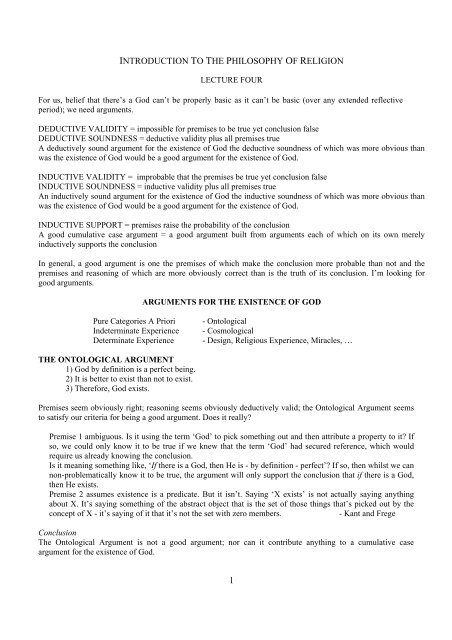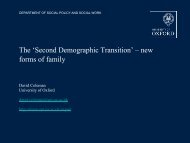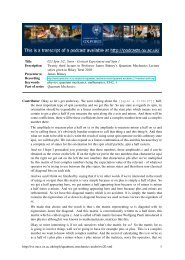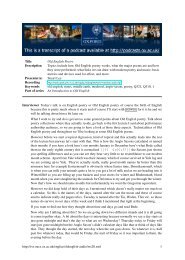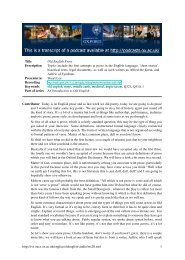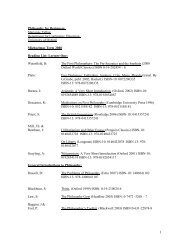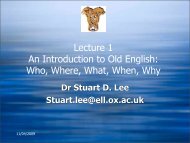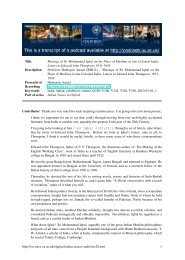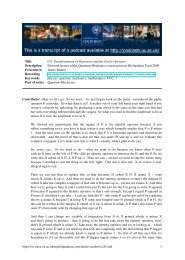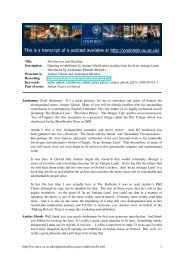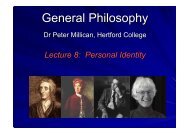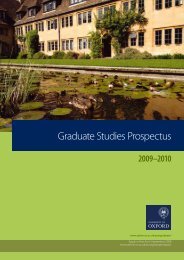1 INTRODUCTION TO THE PHILOSOPHY OF RELIGION
1 INTRODUCTION TO THE PHILOSOPHY OF RELIGION
1 INTRODUCTION TO THE PHILOSOPHY OF RELIGION
You also want an ePaper? Increase the reach of your titles
YUMPU automatically turns print PDFs into web optimized ePapers that Google loves.
<strong>INTRODUCTION</strong> <strong>TO</strong> <strong>THE</strong> <strong>PHILOSOPHY</strong> <strong>OF</strong> <strong>RELIGION</strong>LECTURE FOURFor us, belief that there’s a God can’t be properly basic as it can’t be basic (over any extended reflectiveperiod); we need arguments.DEDUCTIVE VALIDITY = impossible for premises to be true yet conclusion falseDEDUCTIVE SOUNDNESS = deductive validity plus all premises trueA deductively sound argument for the existence of God the deductive soundness of which was more obvious thanwas the existence of God would be a good argument for the existence of God.INDUCTIVE VALIDITY = improbable that the premises be true yet conclusion falseINDUCTIVE SOUNDNESS = inductive validity plus all premises trueAn inductively sound argument for the existence of God the inductive soundness of which was more obvious thanwas the existence of God would be a good argument for the existence of God.INDUCTIVE SUPPORT = premises raise the probability of the conclusionA good cumulative case argument = a good argument built from arguments each of which on its own merelyinductively supports the conclusionIn general, a good argument is one the premises of which make the conclusion more probable than not and thepremises and reasoning of which are more obviously correct than is the truth of its conclusion. I’m looking forgood arguments.ARGUMENTS FOR <strong>THE</strong> EXISTENCE <strong>OF</strong> GODPure Categories A PrioriIndeterminate ExperienceDeterminate Experience- Ontological- Cosmological- Design, Religious Experience, Miracles, …<strong>THE</strong> ON<strong>TO</strong>LOGICAL ARGUMENT1) God by definition is a perfect being.2) It is better to exist than not to exist.3) Therefore, God exists.Premises seem obviously right; reasoning seems obviously deductively valid; the Ontological Argument seemsto satisfy our criteria for being a good argument. Does it really?Premise 1 ambiguous. Is it using the term ‘God’ to pick something out and then attribute a property to it? Ifso, we could only know it to be true if we knew that the term ‘God’ had secured reference, which wouldrequire us already knowing the conclusion.Is it meaning something like, ‘If there is a God, then He is - by definition - perfect’? If so, then whilst we cannon-problematically know it to be true, the argument will only support the conclusion that if there is a God,then He exists.Premise 2 assumes existence is a predicate. But it isn’t. Saying ‘X exists’ is not actually saying anythingabout X. It’s saying something of the abstract object that is the set of those things that’s picked out by theconcept of X - it’s saying of it that it’s not the set with zero members.- Kant and FregeConclusionThe Ontological Argument is not a good argument; nor can it contribute anything to a cumulative caseargument for the existence of God.1
<strong>THE</strong> COSMOLOGICAL ARGUMENT (Contingency Version)1) The universe is contingent.2) Contingency requires explanation – the Principle of Sufficient Reason.3) The necessary God of Theism could explain the contingent universe.4) So the universe is a reason to think there’s a God.Note this isn’t claiming to deductively prove that there’s a God.Possible Criticisms:1) How do you get your argument to stop at God? – Substance Dualism?2) Deny Principle of Sufficient Reason3) Deny contingency of universeIn a deterministic universe of infinite age, every contingent bit of the universe is explained in terms ofanother contingent bit; ipso facto, the whole universe is explained. Or is it? Isn’t it contingent that there is aninfinitely old deterministic universe?Is there a non-question-begging way of deciding whether or not universe is ontologically independent (brutecontingent fact or metaphysical necessity)? My (controversial) answer: No. One’s judgement on thisdepends on the probability one’s already assigned to Theism. Thus …ConclusionThe Cosmological Argument is not a good argument and cannot contribute to a good cumulative caseargument for the existence of God.SUGGESTED READINGBertrand Russell, Why I am not a Christian and Other Essays on Religion and Related Subjects, chapter 13. Thereare other editions in which this radio debate comes as a different chapter. (The full text is also relatively easilyfindable online as is, I am told, a MP3 of it.)T. J. Mawson, ‘Why is there anything at all?’, Y. Nagasawa and E. Wielenberg (eds), New Waves in Philosophy ofReligion (Palgrave Macmillan, 2008) goes through a variety of answers to this question.CAUTIONARY NOTE - O<strong>THE</strong>R POINTS <strong>OF</strong> VIEW – ALL AVAILABLE AT <strong>THE</strong> CLICK <strong>OF</strong> A MOUSE!Right at the start of this lecture, I break ranks with a large and much-discussed (esp. in the USA) movement in thePhilosophy of Religion, Reformed Epistemology. It’s worth looking them up. Kelly Clark gives a good defence ofthe general view here. http://people.brandeis.edu/~teuber/without_evidence_or_argument.pdfThere’s an almost-universal consensus amongst philosophers that the Ontological Argument fails and most wouldagree that the version I discuss fails for the reasons I give. But there are other versions and, if they fail, they(arguably) fail for other reasons. And there are philosophers who think that versions of the Ontological Argumentwork. In particular, Plantinga’s ‘modal’ version of the ontological argument has defenders. The entry on ‘TheOntological Argument’ at Stanford Encyclopaedia of Philosophy http://plato.stanford.edu/entries/ontologicalarguments/is worth reading at some stage.The Cosmological Argument is defended by several prominent philosophers of religion, Richard Swinburne beingperhaps the most famous proponent of it. It’s also worth knowing that there are variants of the cosmologicalargument other than the ‘contingency’ one I discuss in the lecture; I don’t count them as cosmological because itstrikes me they start from ‘determinate’ experience, they have as a premise something like the fact that the universebegan to exist, but that’s a mere terminological preference on my part. William Lane Craig defends the kalamcosmological argument all over the place. Here’s one location where he does so.http://www.youtube.com/watch?v=kQ70I7MPMR8. Find out by going there what he dwelt on as “as a boy, lyingin bed”. (Spoiler: it was the metaphysical impossibility of the actual infinite.)T. J. Mawson2


